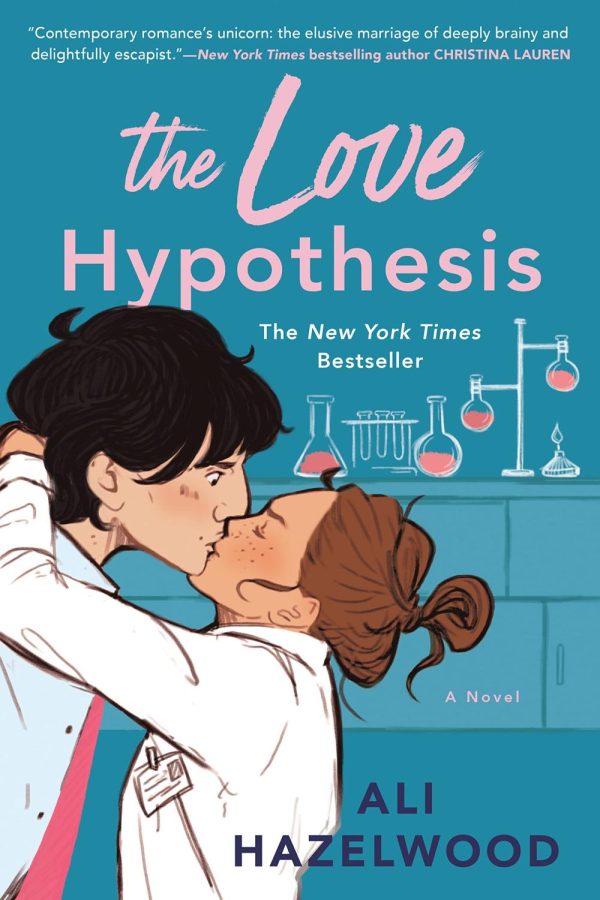BookTok Review: ‘The Love Hypothesis’ encapsulates challenges people face in academia
Novel confronts bias, sexism, sexual harassment in academics
Who would not enjoy a romance novel with a good mix of the fake-dating and opposites-attract tropes alongside a bit of geeky pizazz?
February 8, 2022
In her debut novel “The Love Hypothesis,” Ali Hazelwood took BookTok by storm, garnering thousands of book recommendations from avid readers within mere months of its publication in September.
I bought the novel after it popped up on my For You Page for the fifth time in a row and devoured it in a single afternoon, blissfully ending my day with a cheeky smile. So, let us give Hazelwood a warm welcome to the literary world and dive into this review.
The novel follows Olive Smith, a third-year doctoral candidate at Stanford University who finds herself in a bit of a pickle when she impulsively kisses hot-shot professor Adam Carlsen in order to convince her friend, Anh, that she is seeing someone.
Right off the bat, the dynamic between the two protagonists is comical as they playfully bicker back and forth about filing a Title IX – a federal law protecting people from sexual misconduct within academic settings. I found myself grinning from ear to ear as Olive chaotically tried to explain the juvenile reason behind the kiss to Adam.
Much to Olive’s surprise, Adam decides to back up her lies and agree to a couple of public dates to help solidify their relationship in front of Anh, their peers and their colleagues. Despite the initially awkward start to their “relationship,” Olive and Adam soon begin to enjoy spending time together – so much so that Olive starts to develop real feelings for Adam.
“Everyone likes tall, broody, sullen hunks with genius IQs,” as one of Olive’s friends sweetly put it. And I could not agree more!
Like many readers, I wanted to be friends with all the characters, especially the heroine. Olive embodied everything that everyone needs in a friend: effortlessly funny, wicked smart, loyal and comedically relatable.
I kid you not, though, I almost threw the novel at the wall on numerous occasions because Olive always insinuated miscommunications and misunderstandings between the characters. Like, girl, you are killing me here. Just be honest for once, and maybe your life would go a little bit more smoothly.
I also find that using miscommunications and misunderstandings as a driving factor for conflicts in novels, movies and television shows is just lazy writing. It is extremely overused, especially in romance novels, and just seems forced.
So, to all the current and aspiring authors out there, please, ditch the miscommunication-driven plotlines because it only works in classic literature pieces like “Hamlet,” “Emma” and “Great Expectations.”
Nevertheless, my favorite aspect of the novel, which is also the reason why everyone should read it, is how Hazelwood breathes life into the classic faking-dating and grump/sunshine book tropes by providing an accurate depiction of life in academia.
Hazelwood uses her personal experiences in graduate school to effortlessly represent the challenges many people face in academia, ranging from lighthearted issues, such as living on a tiny stipend, to more serious issues, such as power imbalances and workplace sexual harassment.
“Academia takes a lot from you and gives back very little. It’s hard to stick around without a good reason to do so,” Adam said in the novel, showing the reader the real mental and physical drain of academic research.
Hazelwood also weaves in the occasional STEM-related joke into the plot, making the novel more enjoyable for readers who are currently majoring in – or desire to major in – STEM. I even found myself chuckling out loud at some of the jokes, which made my roommate question my sanity.
The bottom line, though, is that “The Love Hypothesis” is everything avid readers talk about on BookTok and more. If you can get past some of the highly unrealistic scenarios and overused tropes in the novel, I promise you that this will become one of your favorite romantic-comedy novels of this year.









